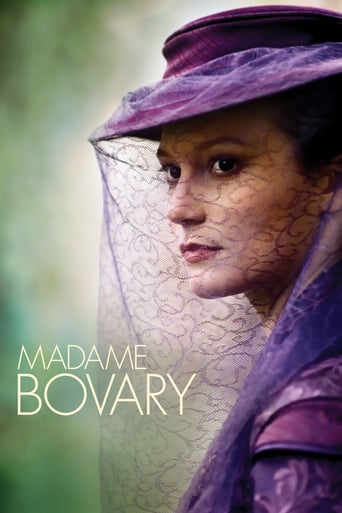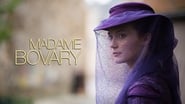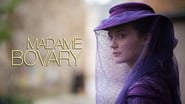Teyss
"Madame Bovary" by Flaubert, the famous literature classic, is one of the most adapted novels on screen and probably the most adapted French book (together with "The Three Musketeers" by Dumas). Notable directors include Renoir (1933), Minnelli (1949) and Chabrol (1991). Some movies are not strictly based on the story but are remotely inspired by it, for instance "Abraham's Valley" by Oliveira (1993).Hence why a new adaptation? In general, the main reasons for filming literature are either to create an altogether new dimension to the story (one of the best examples is "Vertigo" by Hitchcock), either to reveal emotions or thoughts from the book. "Madame Bovary" by Sophie Barthes tries to achieve the latter, with limited success. It almost constitutes a case study of the benefits and limits of novel adaptation.*** WARNING: CONTAINS SPOILERS (INCLUDING OF THE ORIGINAL NOVEL) ***One issue about filmed literature is the necessity to select events, characters, themes, etc. else the movie would run for hours. "Madame Bovary" cuts a great deal from the book. One feels the action runs for less than a year while it actually lasts for eight (from the wedding to Emma's death) or, if we take into account all of the original story, for more than twelve years. Significant characters appear only a few times: Emma's father, Homais, Hippolyte, the priest, the mayor, etc. Many are simply discarded. We do not see Charles' parents nor his first marriage and his wife's death. The Bovarys do not move to a bigger town and, most significantly, they do not have a daughter. Charles has a small role in the movie, while in the book the first chapters are dedicated to him and he remains very present.So the movie focuses on Emma. This would not be an issue if the character and related themes were given more depth. Notably, an important aspect of the novel is how Emma fantasises about an ideal life before crashing against reality (one of the reasons why Flaubert said: "Madame Bovary, c'est moi"). This is famously illustrated by a fabulous party in a castle, thrilling Emma for weeks onwards, during which she idolises a cigar case lost that evening. In the movie, the party is replaced by a hunting scene. Transposing the event is not a drawback in itself; formally the scene is actually well done. However it does not show how Emma becomes exalted: she is just shocked by the deer's death (this has a symbolic meaning of course, but the result is thin). The cigar case afterwards simply becomes an object to return to its owner.Another key scene of the novel is an opera that exalts Emma's romantic feelings. Here, it is replaced by a small concert in a castle, probably because a full-scale opera would have been too costly to produce, which is fair enough. Yet we do not see Emma transcended by art and beauty.A different aspect of the novel's main character is her constant greed, which can render her ruthless. For instance, she nastily dismisses her first maid and she pushes Charles to operate poor Hippolyte purely out of calculated ambition. This is not depicted in the movie, probably not to highlight her dark side, but then her personality loses complexity.I think that direction is responsible rather than acting: Mia Wasikowska is not just pretty, she is a great actress, as she already demonstrated in "Jane Eyre" (Fukunaga), from another 19th century classic. She illuminates the screen with hope, desire, love, joy, misunderstanding, boredom, loss, despair, hate… even though her deep motives are not depicted. Other actors also are convincing and could have shown the full scale of their talent if their roles had not been reduced to a minimum. The most impressive is Rhys Ifans as a manipulative bastard (Lheureux).Another important theme of the book is pettiness, notably in the countryside that Flaubert despised: gossips, shallow friendships, false supports, greed, treachery. This is not shown in the movie, except with Lheureux. Homais even seems to support Charles until the end, in contradiction with the story and the essence of the novel. Eventually the movie also misses Flaubert's cruel ending: the good Charles dies of sorrow, his daughter becomes poor and the sleazy Homais triumphs.Not fully sticking to the novel is not an issue in itself, nor is disregarding some themes and characters, but not filling the resulting gap is. In the end, what emerges from the movie? An excellent illustration of 19th century countryside life: settings, costumes, lighting, colours, occupations, slow pace. Many scenes are shot as beautiful paintings. Rhythm is balanced: slow enough to illustrate everyday life, fast enough to be interesting. Structure is gripping: the whole movie can be seen as a flashback of Emma's life that she remembers as she dies. In summary, apart from the sad story, watching is pleasant.Hence it is unfortunate the film lacks content because if it had more depth, coupled with the existing technique and talented actors, it could have been a great movie. However, to be fair, it is generally considered that none of the previous adaptations of "Madame Bovary" are outstanding, except perhaps "Abraham's Valley".
Asja Vocalist
I loved the novel and was looking forward to the movie. Stopped watching when I first saw Leon. This actor is too young for that role. The color of his voice, his laughter, the look on his face, the overall expression - he looks 18. That ruined the movie for me. What on Earth were they thinking?! Emma would never fall for a guy like that.Oh, talking about Emma... Seriously? Mia Wasikowska? The same way I think they made a mistake with choosing Keira Knightley for Anna Karenina, I think she would have been much better choice for Emma, in this case.OK, enough of bad criticism now. This movie looks expensive and very endearing for the eyes. Both, the costumes and the scenery look realistic. I would imagine XIX century France like this.





